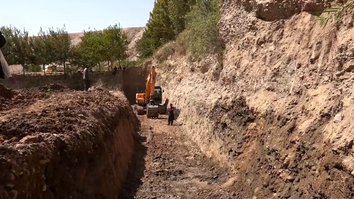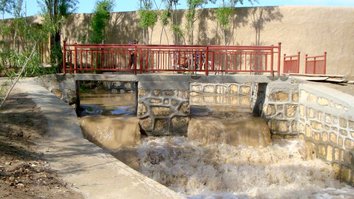BALKH -- Construction of an irrigation canal has begun in Dawlatabad district, Balkh province, according to officials from the Swedish Committee for Afghanistan (SCA).
Estimated to cost 9 million AFN ($102,000) and funded by the United Nations Development Programme (UNDP), the project was launched on August 4.
Once complete, the 3km canal will irrigate about 8,500 hectares of agricultural land in Qarshigak village, Dawlatabad district, improving water distribution and reducing water waste.
The construction project, named "Abadi", will be carried out in two phases, with the first phase estimated to take three months to complete, said Mohammad Edris Amiri, an SCA engineer leading the project.
![Local residents lay the foundation of an irrigation canal in Dawlatabad district, Balkh province, August 4. [Courtesy of Muhammad Nasir Almas]](/cnmi_st/images/2022/09/07/36983-a-585_329.jpg)
Local residents lay the foundation of an irrigation canal in Dawlatabad district, Balkh province, August 4. [Courtesy of Muhammad Nasir Almas]
The first phase will complete half of the canal, which will be 1.5km long, 130cm high and 140cm wide, while the second phase will be completed next year, he said.
During the first phase of construction, hundreds of Dawlatabad villagers will be employed for 72 days, Amiri said.
The purpose of the canal is to address irrigation water shortages, which the farmers have been facing for years, he said.
Dawlatabad district governor Kamaluddin Zahid urged members of the public to fully co-operate with the implementation of the project.
"Dawlatabad residents, especially farmers, have been facing many problems for years as they live in areas with insufficient water, forcing most of them to relocate," he said.
He called on government officials to pay attention to the implementation of development projects in Dawlatabad district to address the public's needs.
"We call on all local and international organisations to help maintain security in Afghanistan, so projects can be implemented without any problems," he added.
Farmers' needs fulfilled
Most Dawlatabad district residents are farmers who have suffered from reduced rainfall and subsequent drought in recent years.
Some farmers said their crops would die every year from water shortages and regular drought, causing them heavy financial losses.
"We have been facing problems due to shortages of irrigation water for years. We could get some wheat but could not grow rice because of a lack of water," said Abdul Hakim, 56, a farmer in Dawlatabad district.
"In addition to wheat, we can grow rice, too, if there is sufficient irrigation water, since there is a large demand for rice," he said. "We can also have more income to improve the economic situation of our families."
Allauddin, 48, a farmer in Dawlatabad district, said the irrigation project will help the economy of the whole area.
"Our crops rely on rainwater, but we have not seen rain since April," he said. "Farmers suffered great losses in agricultural yields due to lack of irrigation water."
"If the problems of our farmers, especially the issue of irrigation water, are addressed, food prices in the markets will go down and the economic situation of farmers will improve as well," Allauddin said.
Irrigation canal project welcomed
"Afghan farmers have suffered losses due to the lack of proper irrigation infrastructure such as dams, canals and retaining walls," said Rohullah Naqshbandi, a resident of Mazar-e-Sharif.
"If dams and irrigation canals are built, not only will our water be properly managed, but the lives of our farmers will also improve since they will be able to make better use of their lands and have two harvests a year."
"Unfortunately, drought and insecurity have badly affected farmers in recent years," he said.
"Our domestic production will increase, and the country's economy will improve if our farmers' problems are addressed," he added.
With the construction of irrigation canals and solutions to the water shortage, farmers will be encouraged to grow other seasonal crops in addition to rice and wheat, and get better yields, said Shamsuddin Khalid, director of the Balkh Department of Agriculture, Irrigation and Livestock.
"In numerous meetings that we have had with officials of non-governmental organisations and aid agencies, they have assured us that they will implement various projects, especially agricultural ones," he said.
"We are hopeful that with the implementation of some agricultural projects, the problems of our farmers such as irrigation water shortages, lack of cold storage facilities and lack of marketing for their agricultural products will be addressed," he added.
The UNDP will implement agricultural projects worth more than $1 million in the country's northern provinces this year, SCA officials said.








The work of the irrigation canal has been started with the financial assistance of the United Nations in Dawlat Abad District of Balkh Province. Through this canal, the farmers of Balkh Province can meet lack of water in their agricultural lands. The broadcasting channel is the most important source of Afghanistan's future. The people of Afghanistan should remember that, the United Nations and or donor organizations have considered to build Afghanistan which shows the treatment of the United Nations toward building Afghanistan. Beginning work on the irrigation canals of Balkh and other provinces are examples of such works by the United Nations. The people of Afghanistan warmly welcome these programs of the United Nations. The people of Dawlat Abad district of Balkh province should stand shoulder to shoulder with the workers of this project so that the work of this canal get completed and put to use, and the farmers of Dawlat Abad district use this water canal properly. With respects, Musawar
Reply5 Comment
If a government or agency truly wants to rescue Afghanistan from deprivation and hunger, it should work on the agriculture sector. Afghanistan has fertile land and a suitable climate for growing various types of crops. Many Afghans are engaged in this sector. After all, farming is still carried out in ancient ways, and agriculture in Afghanistan faces problems due to lack of modern machinery, seeds, and a regulated irrigation system. With modernization of farming, reconstruction, and reformation of its irrigation system, and with the help of modified seeds, I am sure that Afghanistan will not only be self-sufficient in agriculture but also one of the major exporters of agricultural crops in the world. Therefore, it is good that aid agencies pay more attention to this sector so that Afghanistan can stand on its feet.
Reply5 Comment
Such activities are far better than providing free food and money; the food packages may not be enough for a month, and the cash distributed by international organizations is insufficient, while building this channel will help the farmers have many outgrowths. They will be able to consume it throughout the year and also sell a significant part of it in the market. As Alauddin and other farmers of Balkh say, the agricultural corps in this province are highly dependent on water supply, and due to lack of water, their lands were facing the risk of parching; now, as the benefit of this channel, the problem of water shortage will be solved, and the lands will yield again. Moreover, people will also be relieved. Thanks to USAID for its support and assistance.
Reply5 Comment
They have done a good job, thank you. We appreciate and thank the United Nations, the United States, the Swedish Committee, and other aid agencies for their efforts.
Reply5 Comment
We hope they will implement many more such projects in the country. This can prove as medicine for our pains. Our water is getting controlled, and risks are avoided. Also, we find work for our countrymen. Money is not wasted. It is also a long-term project that will be used for years to build the country, and people will benefit from it. If there are more projects like this and people get jobs this way, it will be great fun.
Reply5 Comment